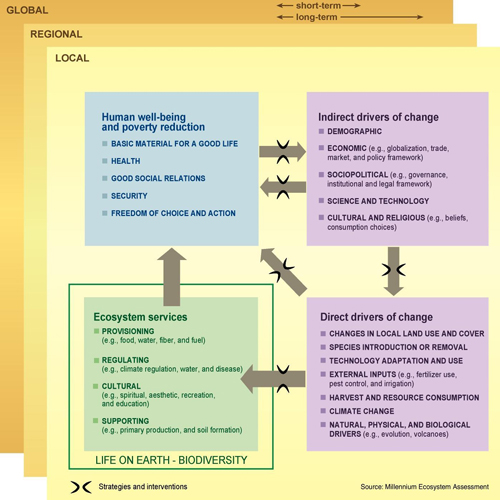The global Millennium Ecosystem Assessment (MA) methodology (Ash et al. 2010) focused on linkages between ecosystem services and human well-being and the influence of direct and indirect drivers of change.

The conceptual framework of the 2005 Millennium Ecosystem Assessment (MA, 2003)
⇒The MA‘s conceptual framework placed human well-being as the central focus for assessment while recognising that biodiversity and ecosystems also have intrinsic value and that people take decisions concerning ecosystems based on considerations of both well-being and intrinsic value. It assumed that a dynamic interaction exists between people and ecosystems, with the changing human condition serving to both directly and indirectly drive change in ecosystems and with changes in ecosystems causing changes in human well-being. At the same time, many other factors independent of the environment change the human condition, and many natural forces influence ecosystems (MA, 2003).
⇒The MA adopted a multiscale approach; it was in part a global assessment, but also included more than 30 regional, national and local assessments (or sub-global assessments). A multiscale approach enables a full assessment of the interactions between people and ecosystems, and facilitates better decision-making at all scales (Haines-Young et al., 2008). This allows the examination of driving forces from outside particular regions, and provides a means of examining the differential impact of ecosystem changes and policy responses on different regions and groups within regions (MA, 2003).
⇒The MA did not aim to generate new primary knowledge, but instead sought to add value to existing information by clarifying how ecosystems, human well-being and intrinsic values in nature are intimately connected. Indeed, one of the defining features of the process was that it collated, evaluated, summarized and interpreted information about these relationships in a clear, powerful and useable form. In particular, the MA applied the judgment of experts to existing knowledge to provide scientifically credible answers to policy-relevant questions. The focus on policy-relevant questions and the explicit use of expert judgment distinguishes the MA from a scientific review (Haines-Young et al., 2008).